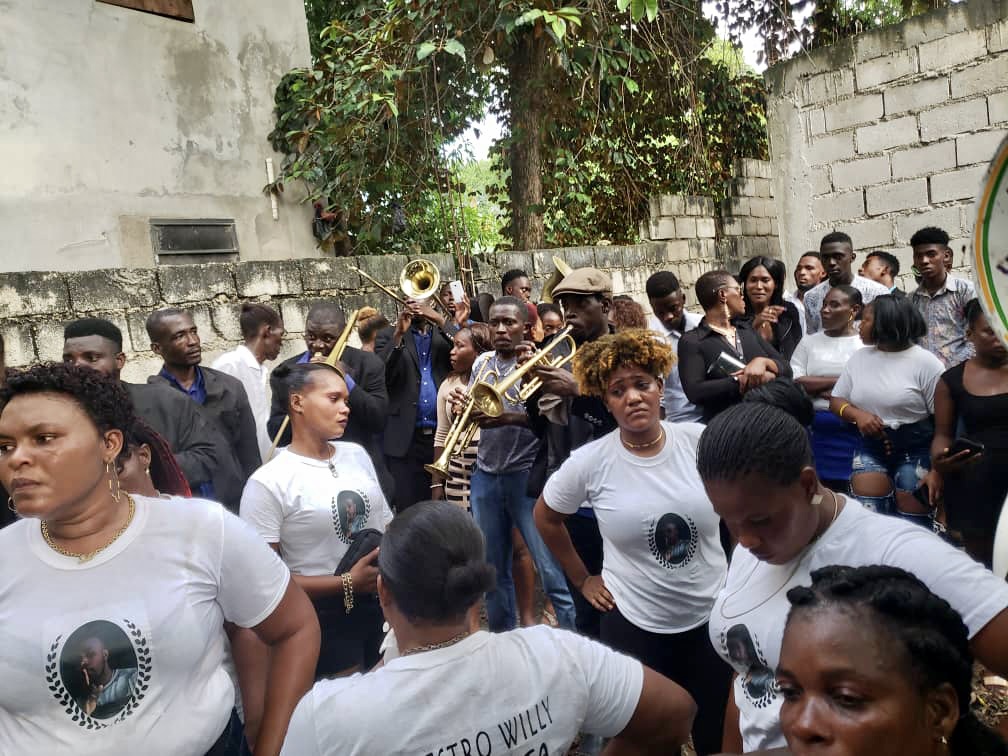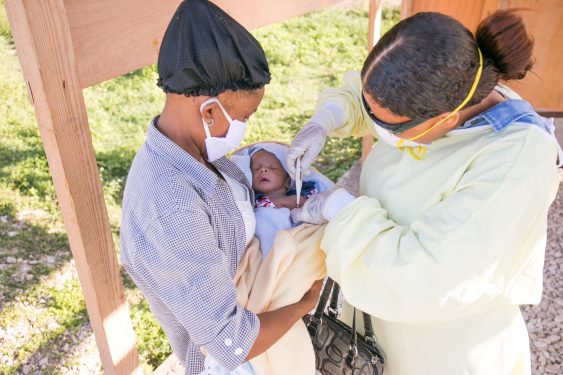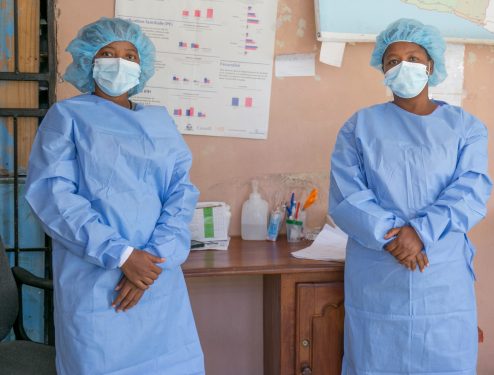
CMMB Director: ‘My greatest fear is that we have the India surge here in Haiti’
WINDSOR TERRACE — Having been ravaged by earthquakes and inundated by hurricanes for years, Haiti now faces a new threat: a potential surge in COVID-19 infections caused by a severe shortage of available vaccines.
Dr. Syndie Saint-Hilaire, a pediatrician in Haiti who specializes in public health, worries that a crisis looming in the Caribbean nation could mirror the pandemic currently erupting in India — and ironically, could be a result of it.
She cited a decision by the Haitian government to delay accepting 130,000 doses of the AstraZeneca vaccine made in India following reports that in rare cases, the vaccine may cause blood clots.
When officials in Haiti finally decided to send for the much-needed vaccines, they were rebuffed by their counterparts in India who said the doses couldn’t be spared because the COVID-19 surge there had reached catastrophic levels.
“We don’t know when the vaccines are coming,” said Dr. Saint-Hilaire, the program director for Catholic Medical Mission Board (CMMB) projects in Côte-de-Fer, Haiti.
And, she added, “We don’t know exactly who is going to send them.”
Meanwhile, she said, “the precarity is very high in Haiti,” placing the impoverished nation on the short end of “vaccine equity.”
The term refers to efforts to overcome the disparity between people who have access to the vaccine and those who do not, especially in poor, underdeveloped countries. Vaccine equity is championed by Pope Francis, who made particular note of it in his 2020 Christmas Day address. In April, leaders at the Manhattan-based CMMB became one of 50 boards in the Catholic Cares Coalition engaged in promoting vaccine equity everywhere.
CMMB’s communications department, led by Luke Dougherty, has helped build digital resources for Catholic parishes and organizations to help educate their communities about vaccine equity. The coalition members also use their various social media platforms to share facts and information about the vaccines, including a comprehensive COVID-19 resource kit for Church leaders from the Vatican.
‘Vaccines For All’
In his Christmas message, Pope Francis stated, “Today, in this time of darkness and uncertainty regarding the pandemic, various lights of hope appear, such as the discovery of vaccines.”
But, he added, “I cannot place myself ahead of others, letting the law of the marketplace and patents take precedence over the law of love and the health of humanity.
“I ask everyone — government leaders, businesses, international organizations — to foster cooperation and not competition, and to seek a solution for everyone: vaccines for all, especially for the most vulnerable and needy of all regions of the planet.”
This call to action adheres to Matthew 25:31-46 — “And the king will say to them in reply, ‘Amen, I say to you, whatever you did for one of these least brothers of mine, you did for me (v. 40).’ ”
“The Holy Father would tell us that this is about love thy neighbor,” said Mary Beth Powers, CMMB president and CEO. “There’s a real call for solidarity and charity that all of us are called to. And other faith leaders are speaking out on this as well, which is really exciting to hear.
“It’s like everyone kind of has a sense of unity, that this is an ‘all-of-us problem,’ and so we have to have ‘all-of-us solutions.’”
Turning On a Dime
Dr. Robert Tiballi, an infectious disease specialist, noted that the U.S. is rapidly approaching widespread inoculations of its population — a milestone for the world.
“We’re just about saturated here in the United States,” he said. “You’re going to see the entire production of the United States vaccine be redirected throughout the world.”
“It’s almost turning on a dime right now, from a U.S.-centric market to a global market for the vaccines,” said Dr. Tiballi, a member of the Catholic Medical Association.
On May 17, President Joe Biden raised his promise to share 60 million doses with other nations by adding another 20 million. The 80 million vials of vaccine could be shipped in a matter of weeks.
“So,” Tiballi said, “six months from now, it’s going to be quite amazing to see how this stuff is going to be widely distributed around the world.
“Unfortunately, that doesn’t help the people who are going to get sick between now and then.”
‘Frustrating and Frightening’
Before the COVID-19 pandemic, doctors and nurses in Haiti had much to celebrate.
Dr. Saint-Hilaire described how HIV/AIDs rates remained low, health programs for women and babies flourished, and amputees — many of them children — received prosthetics.

But all that could be for naught, she said, if the coronavirus overruns Haiti.
“These days, my greatest fear is that we have the India surge here in Haiti,” she said. “If that happens, it’s going to eliminate everything that we have done previously. The health system cannot support this. The economy cannot support this.”
Still, Dr. Saint-Hilaire said Haiti’s populace is largely oblivious to the danger.
As of May 24, Haiti had a total of 13,906 cases of COVID-19 and 288 since the start of the pandemic, according to data issued by Johns Hopkins University in Baltimore. On April 12, there were no new cases in Haiti but on May 24, 171 new cases were reported, with a seven-day average of 64, according to the university report.
“We are having an increasing number of new cases per day and the death rate is also increasing,” Dr. Saint-Hilaire said. “But today, people are acting as if there was no COVID. They do not apply the measures. I go to church, and me and my family are the only ones wearing the mask.”
The doctor’s report about the widespread ignoring of protective measures was confirmed by Ismael Cossogue. He was born in Haiti and now works as a maintenance technician at St. Pius X Parish in Rosedale, Queens. He visits his homeland about four times a year and had returned from a visit there on May 21.
He said observing the disregard for safety was frustrating and frightening, especially as he recalled how Queens suffered so much pandemic death in 2020.
“When you go into the bank, a government office, or the airport, yes they recommend you wear a mask,” he said. “But outside the front door, social distancing in Haiti right now is zero, zero, zero.”
Meanwhile, many Haitians don’t trust their government and, by extension, its health ministry. Some have heard the blood-clotting reports about the AstraZeneca product.
“Let’s say you’re going to bring 100,000 vaccines into Haiti,” Cossogue said. “You might not find 100,000 people ready to take the vaccine right away. They don’t believe in vaccines because they mix everything with politics right now.”
Social Media Good and Bad
Dr. Saint-Hilaire said it would take much one-on-one education by health care workers in the field to reverse the local anti-vaccination sentiment.
“We are expecting a lot of hesitancy,” she said. “When we do surveys, we ask who is going to take the vaccine. Not that many people say ‘yes.’”
Powers and Dougherty said that many remote communities have no traditional media to deliver accurate reports about vaccines. However, they do have access to freewheeling opinions — including disinformation — disseminated on social media. But Catholics in the U.S. can help counter disinformation by sharing vaccine experiences, and their health benefits, on their own social media platforms, Powers said.
Retired Auxiliary Bishop Guy Sansaricq of Brooklyn, who is from Haiti, said most communication in the country is person-to-person, not via technology.
“There is no instruction,” he said. “The government is totally incompetent and corrupt. Unfortunately, more than half of the population is illiterate. So they get their information by word of mouth.”
Bishop Sansaricq is the founder and director of the Brooklyn-based National Center of the Haitian Apostolate. The group’s vice director is Msgr. Pierre André Pierre, a former president of the Catholic University of Notre Dame of Haiti. The monsignor agreed with Bishop Sansaricq but added that because the government is distrusted, people feel they are on their own, and thus tend to make decisions based on what they believe is good for themselves.
Consequently, Msgr. Pierre said there is no shared concept of the Catholic teaching about what’s good for everyone — the so-called “common good.” But parish priests in Haiti could reinforce that lesson to help educate people to get vaccinated, he added.
“I know the country from east to west, to north and south,” he said. “And the Catholic Church is a real presence, not only in the liturgy, not only in the celebrating of Eucharist, but also on the social aspect, providing support to schools, providing health care, and providing social education in so many different ways.”
Lead from behind
Powers said the AstraZeneca and Johnson & Johnson vaccines don’t require “hyper refrigeration,” so they are good options in tropical or arid climates in countries served by CMMB.
But, she added, amplifying the worldwide vaccine surplus is only part of the solution.

“At the end of the day that’s only going to bring the vaccine to the capital city,” Powers said. “The important part is the supporting of Catholic organizations like CMMB and others who are on the ground, helping to deliver that vaccine to communities.”
She explained that such locales often face numerous logistical chokepoints, like transportation. CMMB also works in Kenya, Zambia, South Sudan, and Peru, to name a few, where traveling on roads can be dicey.
“In South Sudan, they’re about to get a shipment that we need to help distribute by July 15,” Powers said. “But the roads are terrible and we don’t have enough vehicles. So, it really is a logistical challenge to get the vaccine into people’s arms.”
Dr. Saint-Hilaire said the government has yet to share how it would bring the vaccines to people, once the doses arrive.
“As of today, there is no distribution plan,” she said on May 21 in a video conference call from Haiti. “I think that we should have working groups and planning on how we are going to supply everyone, how we are going to organize everything. But nothing like this is happening.
“This is the prerogative of the ministry of health, so it has to come from them. But we can lead from behind and push for setting up the plan for distribution of COVID-19 vaccines.”
Powers reminded that the coronavirus is not “so special” in how it attacks healthy people; vigilance and global cooperation can keep it and other viruses in check.
“All viruses want to win,” Powers said, “so they keep changing themselves by mutating to try and find a successful way to spread. And that’s going to continue to happen.
“So none of us are really completely protected until all of us are protected.”
